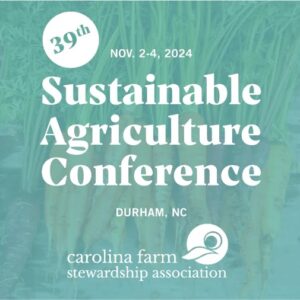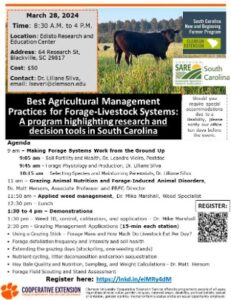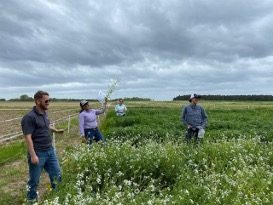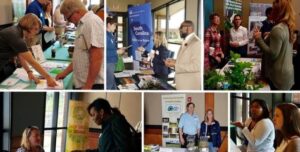Final report for SSC21-001
Project Information
The overall objectives of the 2021-2022 SC SARE Program will be to continue the existing strategic and collaborative planning process for statewide sustainable agriculture development; provide professional development opportunities for Extension agents, NRCS field staff and other agriculture professionals; reward outstanding service; and to continue to organize and support in-service training in sustainable agriculture practices. The MSP Assistant will work with the state SARE coordinators and program advisory committee to organize training activities for 1890 and 1862 Extension and other agriculture professionals that will address critical needs identified by program stakeholders. The program is guided by stakeholder input through an advisory committee consisting of farmers, agriculture professionals, non-government representatives and others with an interest in sustainable agriculture development. Our mission/strategic plan is to foster the adoption of sustainable agriculture practices statewide through education and outreach programs on relevant topics for Cooperative Extension Service personnel, Natural Resources Conservation Service staff and other agriculture professionals, farmers, and landowners. The overall program mission/plan will not change however, training topics have been revised based on current needs identified by our program stakeholders. The program advisory committee met on January 13, 2021, and identified priority topics for 2021-2022 training programs. The MSP Assistant position will continue to facilitate program reporting and evaluation and will assist with project accounting and budgeting. A joint budget for Clemson and South Carolina State University has been developed. Funds will be administered through Clemson; South Carolina State University will submit invoices for training expenses to the Clemson Sustainable Agriculture Program.
- Continue the existing strategic planning process for statewide sustainable agriculture development. Building on new and existing collaborations with stakeholder groups, the state co-coordinators will work with the MSP Assistant and with the SC SARE Advisory Committee to broaden the pool of stakeholders including under-represented groups who are involved with the planning process and the development of educational programs. As in previous years, an annual sustainable agriculture retreat will be organized in fall/winter to identify priorities and to plan educational programs based on stakeholder needs. We will continue to collaborate on training programs with stakeholder organizations and with SARE PDP personnel from neighboring states when appropriate. The comprehensive and inclusive planning process will limit duplication of effort and will help to leverage available resources.
- Continue to provide professional development opportunities for Extension agents, NRCS, FSA and state Department of Agriculture staff and other sustainable agriculture educators. The outcomes of this objective are that our agriculture professionals will enhance their knowledge and competency in sustainable agriculture, they will increase their contact with the sustainable agriculture community, and they will be recognized as local experts to be called upon for information on sustainable agriculture. Travel scholarships will be provided for select Extension agents and agricultural professionals to attend the 2021 Carolina Farm Stewardship Association (CFSA) Sustainable Agriculture Conference (November) and other sustainable agriculture educational events as funds are available. These events represent valuable educational opportunities for our agents and other agriculture professionals and facilitate interactions between agriculture professionals and farmers.
- Revive the “Outstanding Sustainable Agriculture Extension Agent of the Year” award to recognize SC cooperative extension personnel for excellence in sustainable agriculture outreach. A call for nominations will be released in summer of each year open to 1890 and 1862 personnel. The award recipient will receive a travel scholarship to attend a sustainable agriculture event and a plaque recognizing their service to the sustainable agriculture community. The award will continue to encourage the development of innovative public outreach programs by our Extension agents. Due to COVID-19 no award nominations were solicited for 2020 since travel was prohibited
- The SC SARE PDP Program will continue to organize and foster, and help support in-service training opportunities for Extension agents, NRCS, FSA and state Department of Agriculture personnel, agricultural educators, and for other interested persons as space permits. Workshop topics will be determined annually by the Advisory Committee (see listing of Winter 2021 workshop topics below). The MSP Assistant, in consultation with the coordinators and the SC CFSA representative, will have overall responsibility for workshop organization, publicity and evaluation.
Advisors
- (Researcher)
- (Educator)
- (Researcher)
- (Educator)
Education
An interdisciplinary and participatory approach was taken to all trainings whenever it was possible. Stakeholders and advisors were involved in prioritizing and planning trainings for the program year and trainings were designed for the primary audiences of 1862 and 1890 Extension agents, NRCS conservation field staff, and mentor farmers, and other agricultural professionals. These trainees serve small and large scale farms who utilize both conventional and organic/regenerative practices (or a combination). The a priori stakeholder input resulted in well received and timely trainings which reinforced trainee participation and enthusiasm for the programs. Participants increased competency and skills in areas of sustainable agriculture. They gained knowledge and confidence that enabled them to respond positively and knowledgeably to client inquires regarding principle and practices of sustainable agriculture. We are continuing to utilize heavy stakeholder input in future SARE Model State Programs and will fund and conduct trainings deemed important and useful by our stakeholder committee.
Education & Outreach Initiatives
Train service providers
SC SARE funded a train-the-trainer session hosted by the Clemson University Organic Certification Program that focused on training service providers in the rules and regulation required to be organic certifiers. This was conducted in partnership with The Southeast Transition to Organic Partnership Program and was focused on small farmers.
The event was free and provided a general overview of organic certification and tools for new and transitioning organic farmers. The main topics covered were Organic Systems Plans (OSP), organic regulations, organic crop practices and addressing misconceptions of organic certification. The classroom session was held at the Phillips Market Center and hosted by the SC Department of Agriculture. Classroom participants could then choose to attend and participate in one of two Mock Inspections located either at the Clemson University Organic Research Center (Upstate location) or the Clemson University Coastal Research and Education Center near Charleston (Low State Inpection). Participants gained a firsthand look at issues and expectations of organic inspections and record keeping requirements. The training was geared toward the new or transitioning organic farmer.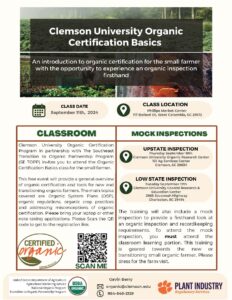
Expose and train Extension agents to sustainable agriculture practices
Agents attended multiple presentation-style and hands on workshops related to sustainable agriculture which included programs on soil health, regenerative agriculture, integrated pest management and organic pasture, crop and horticultural practices.
Expose Extension agents and mentor farmers to practices and decision support tools available for forage and livestock management.
This day-long event was hosted by Dr. Liliane Silva of Clemson University and highlighted a wide variety of topics including soil fertility and health, forage physiology and impacts on production, forage selection, grazing animal nutrition, and applied week management. In the afternoon multiple demonstrations reinforced classroom and lecture concepts and demonstrated the use of a variety of tools to estimate forage mass, grazing days, soil health and nutrient cycling.
Participants were exposed to a wide range of forage and animal nutrition concepts in the classroom and these concepts were reinforced with field activities and demonstrations. Participants reported that they were likely to utilize these concepts and tools when making farm visits and educating farms on practices related to sustainable pasture management and animal husbandry.
To expose farmers to resources available from Southern SARE including producer grants.
The South Carolina Farmer Resource Rodeo occurs annually in the Columbia SC area. This is a very fast-paced high-energy networking gathering designed to connect a wide variety of farm resource provider organizations with new, emerging and small-scale farmers from all across the state of South Carolina.
To improve participant knowledge of 1) basic pollinator biology, life history and nesting habits 2) Plant species that provide suitable forage for native and managed pollinators 3) equipment and techniques for proper installation and management of pollinator forages and 4) Methods for monitoring project progress.
Two workshops were hosted that targeted Extension professionals, USDA personnel, growers, solar developers and municipal officials. SARE sponsored this program which was designed and hosted by Clemson apiculture specialist Ben Powell. The workshop utilized a combination of classroom lectures and in-field demonstrations of pollinator habitat and best practices. 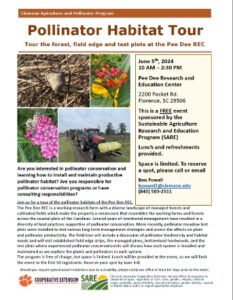
The workshops were fully attended by the targeted professional groups and a follow up survey will be conducted to evaluate impacts and perceptions of the program.
Educational & Outreach Activities
Participation summary:
Learning Outcomes
Project Outcomes
Face of SARE
SARE promotion is achieved by sponsorship and participation in a wide array of workshops and trainings associated with sustainable agriculture. This reaches hundreds of people in face to face interactions. Additionally, we maintain a webpage (https://blogs.clemson.edu/sc-sare/) that allows us to post updates events and news regarding the SC SARE program and we also maintain a listserv which allows us to contact stakeholders and interested parties regarding events easily. We also regularly man informational booths at a variety of events and solicit ideas from Extension professionals for SARE workshops and training events which raises the visibility of SARE among trainers.
